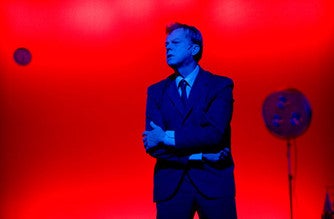Theatre review: Doktor Glas, Wyndham’s Theatre, London

Which walking wreck of a Wallander did you prefer on television? The surprisingly convincing Kenneth Branagh version of the wiped-out alcoholic detective, or the more obviously authentic Swedish original of Krister Henriksson?
Either way, it’s still misery a-go-go all round, for while Branagh warms up for Macbeth in Manchester, Henriksson has landed in London with his acclaimed 2006 monodrama, Doktor Glas.
Doktor Glas is a stressed-out Stockholm physician who has fallen in love with a female patient whose husband is a sexually demanding and physically revolting pastor. Helga wants Glas to “diagnose” an infection of the womb so she can continue an affair with another man.
The story derives from a 1905 Swedish confessional novel by Hjalmar Söderberg, a friend of Strindberg, that became a bleak Mai Zetterling movie in 1968 and a successful one-man show shortly after; Henriksson is doing that Allan Edwall adaptation, and flagging up a psychological crisis involving sex, death and cyanide in a time, he says, of violently fluctuating public morality.
Watching Henriksson, patently a great actor, but one who is here shamefully microphoned, presumably so that he can whisper the words in a cinematic hush, occasionally backed by a creepy soundtrack, is a mixed blessing. He’s played Peer Gynt, as well as Leontes for Ingmar Bergman, and he has a great trick of conveying inner turmoil with an absolute minimum of expression.
But with the false sound system, he’s not in the same room as us, and that matters in a play that is really all about the audience eavesdropping. Also, while the dramatic situation is indeed intensely dramatic, it’s not translated into good theatre as a) there are no other characters on stage and b) Doktor Glas never wins our sympathy in the manner of the true button-holing tragic hero.
There’s one great moment when he “tests” the fatal pill in a sleight of hand, and he seems finally to inhabit a twilight world between his own reality and the nightmares that have shaped his destiny; the lighting of Linus Fellborn casts sickly colours and silhouettes on the various encounters Glas relates on either side of a traverse curtain in his office.
But the wind-up at the end, with a quick blast Lou Reed’s “Perfect Day,” is a sure sign that the rest of the performance hasn’t quite done its work, and Henriksson retreats to his den and draws the curtain.
To 11 May (0844 482 5120)
Subscribe to Independent Premium to bookmark this article
Want to bookmark your favourite articles and stories to read or reference later? Start your Independent Premium subscription today.

Join our commenting forum
Join thought-provoking conversations, follow other Independent readers and see their replies